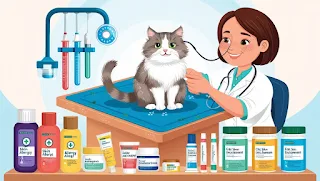Understanding Cat Allergy Symptoms
Cats, like humans, can suffer from allergies that manifest in various symptoms. Recognizing these symptoms early can help in providing timely relief for your feline friend. Common cat allergy symptoms include excessive scratching, licking, or biting at their skin, which often leads to hair loss or bald spots. You may also notice red, inflamed skin, scabs, or sores. In some cases, cats may experience respiratory issues such as sneezing, coughing, or wheezing. Additionally, gastrointestinal problems like vomiting or diarrhea can also be indicators of an allergic reaction.
Identifying Cat Skin Allergies
Cat skin allergies are a common issue that can cause significant discomfort for your pet. These allergies are often triggered by environmental factors, food, or parasites. Environmental allergens such as pollen, mold, dust mites, and certain cleaning products can cause skin reactions in cats. Food allergies, on the other hand, are typically due to specific proteins found in their diet. Parasites like fleas are another major cause of skin allergies, as cats can have allergic reactions to flea bites. Identifying the specific allergen responsible for your cat's skin issues is crucial for effective treatment.
Recognizing Symptoms of Cat Allergies
Being able to recognize the symptoms of cat allergies is essential for early intervention and treatment. The most common symptoms include persistent itching and scratching, which can lead to open sores and secondary infections. Cats may also exhibit signs of discomfort such as excessive grooming, hair loss, and the development of hot spots. In addition to skin-related symptoms, cats with allergies may also experience respiratory issues like sneezing, nasal discharge, and watery eyes. Gastrointestinal symptoms such as vomiting, diarrhea, and changes in appetite can also be indicative of an allergic reaction.
Common Cat Allergies and Their Triggers
Cats can be allergic to a variety of substances, and identifying the specific trigger is key to managing their condition. Common cat allergies include:
- Environmental Allergens: Pollen, mold, dust mites, and certain cleaning products can cause allergic reactions in cats.
- Food Allergies: Certain proteins found in cat food, such as beef, chicken, fish, and dairy, can trigger allergic reactions.
- Flea Allergies: Flea bites can cause severe itching and skin irritation in cats, leading to allergic dermatitis.
- Contact Allergies: Substances that come into direct contact with a cat's skin, such as certain fabrics, shampoos, or chemicals, can cause allergic reactions.
Understanding these common allergens and their triggers can help in preventing and managing allergic reactions in cats.
Treating Allergic Dermatitis in Cats
Allergic dermatitis is a condition where a cat's skin becomes inflamed due to an allergic reaction. Treating allergic dermatitis involves identifying and eliminating the allergen, as well as providing relief for the symptoms. The first step is to consult with a veterinarian to determine the specific cause of the allergy. Once the allergen is identified, it should be removed from the cat's environment or diet. Treatment options may include topical or oral medications to reduce inflammation and itching, as well as specialized shampoos to soothe the skin. In severe cases, your veterinarian may recommend allergy shots or immunotherapy to help build your cat's tolerance to the allergen.
Managing Feline Skin Irritation
Feline skin irritation can be caused by a variety of factors, including allergies, parasites, and infections. Managing skin irritation involves addressing the underlying cause and providing relief for the symptoms. Regular grooming and bathing with hypoallergenic shampoos can help reduce irritation and keep your cat's skin healthy. Flea control is also essential, as flea bites are a common cause of skin irritation. In addition, maintaining a clean and allergen-free environment can help minimize exposure to potential irritants. If your cat's skin irritation persists, consult with a veterinarian for a proper diagnosis and treatment plan.
Effective Cat Itching Remedies
Itching is a common symptom of cat skin allergies and can cause significant discomfort for your pet. There are several effective remedies to help alleviate itching and provide relief for your cat:
- Medications: Antihistamines, corticosteroids, and other medications prescribed by a veterinarian can help reduce itching and inflammation.
- Topical Treatments: Creams, ointments, and sprays specifically formulated for cats can provide soothing relief for itchy skin.
- Bathing: Regular baths with hypoallergenic or medicated shampoos can help remove allergens from your cat's skin and reduce itching.
- Dietary Changes: Switching to a hypoallergenic diet or a diet with novel proteins can help reduce food-related allergies.
- Environmental Control: Keeping your home clean and free of dust, mold, and other allergens can help minimize your cat's exposure to potential triggers.
Implementing these remedies can help manage your cat's itching and improve their overall comfort and well-being.
Recognizing Signs of Cat Allergies
Recognizing the signs of cat allergies is crucial for early intervention and treatment. Common signs include excessive scratching, licking, or biting at the skin, which can lead to hair loss and open sores. You may also notice red, inflamed skin, scabs, or sores. Respiratory symptoms such as sneezing, coughing, and wheezing can also indicate an allergic reaction. Additionally, gastrointestinal issues like vomiting, diarrhea, and changes in appetite may be present. If you observe any of these signs in your cat, it is important to consult with a veterinarian for a proper diagnosis and treatment plan.
Conclusion
Cat skin allergies can cause significant discomfort and distress for your feline friend. By understanding the symptoms, identifying the specific allergens, and implementing effective treatment options, you can help provide relief and improve your cat's quality of life. Regular veterinary check-ups, a clean environment, and proper grooming are essential in managing cat skin allergies and ensuring your cat remains healthy and happy. If you suspect your cat is suffering from allergies, do not hesitate to seek professional veterinary advice for a comprehensive diagnosis and tailored treatment plan.



